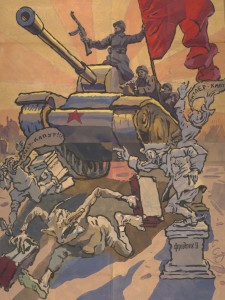May 9, 2013, by Sarah Colborne
“Hitler is kaput!”: Soviet war poster victory celebrations
As Victory Day (Thursday 9 May) is marked across Europe, the celebratory sentiments of some of the Soviet propaganda posters featured in the online exhibition Windows on War, are still powerful, even though almost 70 years has passed since the war ended. The posters appeared almost daily in the windows of TASS, the Central Telegraph Agency in Moscow, the main news distributor during the Soviet period.
Germany surrendered on 8 May 1945, and the war in Europe was over. A number of posters sum up the excitement of final victory and the assertion of Soviet power. One of the posters featured in the online exhibition, which appeared on the 12th May 1945, celebrates the arrival of the Red Army in Berlin on the 30th April 1945 (the very day of Hitler’s suicide). It depicts Hitler fleeing the Russian tanks, with toppled German statues declaring “Hitler is kaput”.
View the poster online in all its striking detail and read about the accompanying verse by Lebedev-Kumach, in which Berlin’s Victory Avenue is turned into Avenue Kaput, or ‘Avenue of the Broken’.
The exhibition is a collaboration between the University’s Department of Russian and Slavonic Studies, Manuscripts and Special Collections and the Web Technologies team. It is curated by Cynthia Marsh, Emeritus Professor of Russian Drama and Literature.
Visit the exhibition at windowsonwar.nottingham.ac.uk/
Follow the exhibition on social media at:
- [Twitter] https://twitter.com/windowsonwar
- [Facebook] https://www.facebook.com/WindowsOnWar
- [Tumblr] http://windowsonwar.tumblr.com/
- [Flickr] http://www.flickr.com/photos/windowsonwar


Posters created around the time of Victory Day 1945 signal changes to public language. The style recalls the political rhetoric of the 1930s when poster art celebrated the goals and achievements of Soviet power.
The Victory windows signal the change about to come to many areas of daily life as Soviet state control was re-exerted in the months after the war. Writers, the key users of public language, became targets for scrutiny. The treatment, for example, of Akhmatova and Zoshchenko was brutal. They were reduced to silence.
This is a fantastic example from the Windows on War collection! It’s especially interesting to consider on Victory Day (Den’ Pobedy in Russian), which remains one of the most important and unifying events of the Russian calendar. Celebrations in Russia are on a grander scale than those seen for Remembrance Day in the UK (some 11,000 troops, 101 examples of Russian military hardware, as well as fighter jets and helicopters take part). This morning, the vast parade on Red Square in Moscow recreated the euphoria of this victory over Nazi Germany; and tanks, like those seen in the poster, still play an important part in the military mythology of The Great Patriotic War (WWII) in Russia. The celebrations will continue throughout the day, demonstrating how the patriotic feelings first inspired by these posters are still felt today.
Like Laura, I was particularly struck by continuities. My twitter feed this morning was one long parade of photographs of tanks! They are the part of the parade that still seems to get everyone excited. A great choice of image to put the iconography of today’s celebrations into historical context.